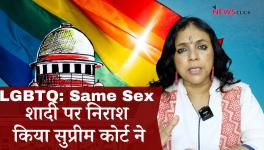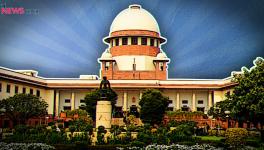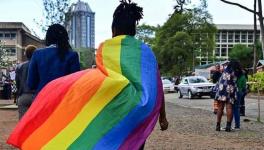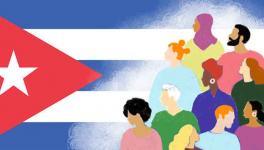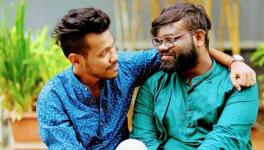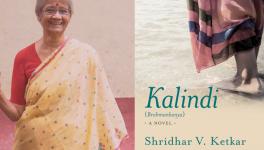‘Family Must Go Beyond Blood and Marriage’—Petitioner in Marriage Equality Case
Queer feminist indigenous activist with disabilities, Rituparna, speaks with NewsClick on the ongoing Supreme Court hearings in the ‘marriage equality’ case. She is a part of the Lesbian, Bisexual, Intersex Women and Transgender (LBIT) network, a loose pan-India group of individuals and organisations, which has joined this petition. They are raising a unique set of questions and demands related to India’s notions about family. Family is regarded as an institution that protects and nurtures, but rarely, if ever, is it recognised as a site of cruelty and abuse, especially towards non-binary and non-heteronormative individuals. Therefore, the six anonymised names and four activists, all long-time members of organisations representing queer feminist discourses, are seeking in the Supreme Court the recognition of the right to choose their own family—and exit the ones they were born in.
What made you join the marriage equality petitions being heard in the Supreme Court?
Let me start with a frank admission: We in the LBIT movement did not think of the marriage equality petition as the obvious next step for ourselves. We believe a non-discrimination law would be a more effective next step for us—a law which recognises our healthcare needs, devises a plan for reservations for trans persons, assures our access to education, and stops bullying and familial violence against us.
But when the marriage petition arrived, the LBIT network joined the proceedings as a collective. Our work revolves around crisis management across India, not just in elite urban areas but in rural and semi-urban areas, and from our experiences, I can confirm that the family violence issue is severe and genuine. We have dealt with cases of violence as serious as attempts to murder by family. Queer and trans persons, including someone like me—I am an indigenous person from Assam—have learned over decades of work that our idea of a family must go beyond blood and marriage.
Is your position on equality of marriage, which is really getting a lot of the media attention, different from what the other eight petitioners are seeking?
We do not say no to marriage, but if cis-feminists have not been able to demolish this patriarchal institution, we cannot be expected to carry that burden! We wanted to bring our perspective to the court, even if to us, to be able to marry (or not) is not the biggest question. Our focus is primarily on natal family violence and that we, as queer people, also have a chosen family that is not legally recognised. It is impossible not to notice that in the Supreme Court, it is primarily upper-class gay men spearheading the marriage petition. Many have found some familial acceptance for their relationships, and so legal recognition is really all they want—and the ability to share or transfer pension benefits, investments, and so on.
But to those of us who live in remote rural and semi-urban parts of the country, the critical issue is family itself. Our chosen family might be more critical to us than our birth family—and it may not be our romantic partner. I have a chosen family, too, and sometimes they come before my romantic sexual partner. My chosen family has seen me through thick and thin, my breakups and joys, and supported me through it all. They are who I can call in the middle of the night.
My partner Amrita and I have some privilege too. We open our doors open to those in the community who need us, for something as simple as a home-cooked meal, to more complex assistance. So, if we get the right to form a family, it should be with or without marriage.
What would be your take on the notion that certain rights can accrue without marriage, and what are your pleas regarding anti-discrimination before the Supreme Court?
We say, why not bring the issues that concern all of us—such as being able to nominate someone from our chosen family on our financial instruments—into the marriage equality debate? Even today, a bank or financial institution may permit you to nominate your choice of person on, say, your insurance policy. But this is a privilege you may have to fight for—and not everybody can fight a system that views only the natal family as family. The fundamental notion we are challenging is that you can only have partners by marriage or birth.
Amrita and I also wanted to check if rights could be separated from marriage, so we tried to open a joint account in a public sector bank. Initially, the bank declined, but we asked the manager to put the refusal in writing. Soon after, our application was cleared. Now, we had stated in our application to the bank that we were romantic sexual partners applying for the account together. But can everybody go to a bank or financial body and demand a reason in writing or declare their relationship openly? Can I open an account with my chosen family, apply for a home loan or file taxes with them? The answer would be—no.
Or think of the person Amrita and I have ‘adopted’. They regard us as what many cishet persons would call a parent. But if Amrita and I leave our property to them, it would be contested.
I have no natal family—my father has passed away, and my brother is violent towards me. But Amrita is not legally regarded as my family. Nor is my queer mother who supports me in every way. How many of us know that even two heterosexual sisters will struggle to take out a home loan together? Therefore, our petition is from the queer perspective, but we are looking at issues that concern every woman, especially single women.
What have been your key findings with respect to how familial relations with non-heteronormative children?
We recently published a report, Apnon Ka Bahut Lagta Hai—It Pains More When Our Own Hurt Us—based on testimonies of 31 queer women and trans persons describing the violence their families inflicted on them: They were subjected to mental and psychic tortures, corrective rapes, and conversion and electric shock ‘therapies’. We understand family as a place of caring and nurturing, but these testimonies show we still need to think over what family is and can be. Our report has been submitted to the Supreme Court.
What has struck you, so far, as important in the hearings—in particular regarding the government’s position in the court?
When it is said in court that we are ‘not equal’, it insults us. We need this equality. We want to form our chosen families who support us in crises—as when our next of kin are coming to kill us, when hospitals insist only our abusive relatives can visit us when we are sick. We want to end the collusion of police and family that undercuts our status as equal citizens. We question the heavy premium our society puts on a marriage and believe that its inherent problem is it leaves no room for other ideas, but we believe we have the right to marry. Let us admit that if heterosexual monogamous marriage as an institution had been on the chopping block, we would have demolished it long ago.
The opposing lawyers argue in court that marriage is a social institution and represents Indian sanskara, but they do not get what India is. In Assam, there exists a tradition of burha vivah—literally meaning marriage of old people—where a couple elopes and lives together, and has social acceptance. India has many other traditions, like the Kalbeliyas in Rajasthan, who marry when they have money. Maybe the culture the State and conservatives are talking about is a homogenous thing, which India is not.
Of late, the discussion on the Special Marriage Act has been revived, especially due to efforts by rights groups to highlight its problems. What are the changes you wish to see, and why?
Yes, to stop police and family from colluding and undercutting our status as equal citizens, we want amendments to the problematic provisions in the Special Marriage Act, starting with the 30-day notice period it requires. When parents discover our relationship and intent to marry, they can become a danger to us. We have had to file habeas corpus petitions to save trans persons from such families. We recently rescued a person whose family had taken them to a far-off area in Rajasthan and locked them up in a windowless room.
Couples often come to Delhi when they want to marry, but the 30-day notice period is enough time for the police to find and force them to return to their natal family. The irony is that if the same couple finds an Arya Samaj temple, they can marry there in minutes or hours. The domicile requirement in this law also hurts many couples.
What, in a nutshell, are your demands?
Full citizenship, the right to have a chosen family, the right to exit from our natal family, and the right to marry.
Get the latest reports & analysis with people's perspective on Protests, movements & deep analytical videos, discussions of the current affairs in your Telegram app. Subscribe to NewsClick's Telegram channel & get Real-Time updates on stories, as they get published on our website.









